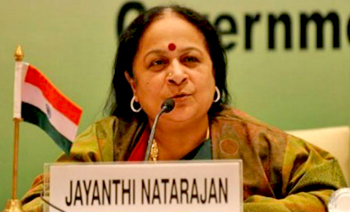New Delhi, Jan 30: Senior party leader Jayanthi quit Congress on Friday after launching a fierce attack on Rahul Gandhi.
In a letter to the Congress President Sonia Gandhi she said after she was unceremoniously removed as Minister of Environment in December 2013, Rahul Gandhi’s office planted negative stories about her.
Talking about her resignation, Natarajan wrote, "The next day my resignation was headlines in the media, and all the initial reports correctly reported that I had stepped down for party work. By the afternoon, to my shock, I received information that persons from the office of Shri Rahul Gandhi were calling the media and planting stories that my resignation was NOT for party work."
She also stated that till date she has not be told the reason behind her dismissal from the post of Minister of Environment.
After accepting her resignation, the then Prime Minister Manmohan Singh had praised her for her valuable contribution as a minister, she added.
"I was a victim of vicious, false and motivated media campaign," Jayanthi Natarajan wrote in her letter to the Congress.
She stated that Rahul Gandhi's decisions were dumped on her and she has proof to back her claims.
Natarajan also revealed that she was forced to attack Prime Minister Narendra Modi on snoopgate.
The letter published in a daily said the Minister was asked to resign in less than 100 days before the country went to general elections.
The four-time Congress MP's decision has added to the overflowing cup of woes of the Congress and triggered a barage of attack by BJP leaders on the style of governance of the UPA regime.
Natarajan is the second leader in Tamil Nadu to quit the party after G K Vasan who has already floated a party.
The Tamil Nadu unit of the Congress is facing internal bickerings and the latest incident being the act of defiance by Karti Chidambaram, son of senior leader P Chidambaram, who refused to reply to a show cause notice issued to him by the state unit for his alleged anti-party remarks.
The former UPA leader is scheduled to address a press conference at 12:30 pm today on her resignation.






Comments
Add new comment